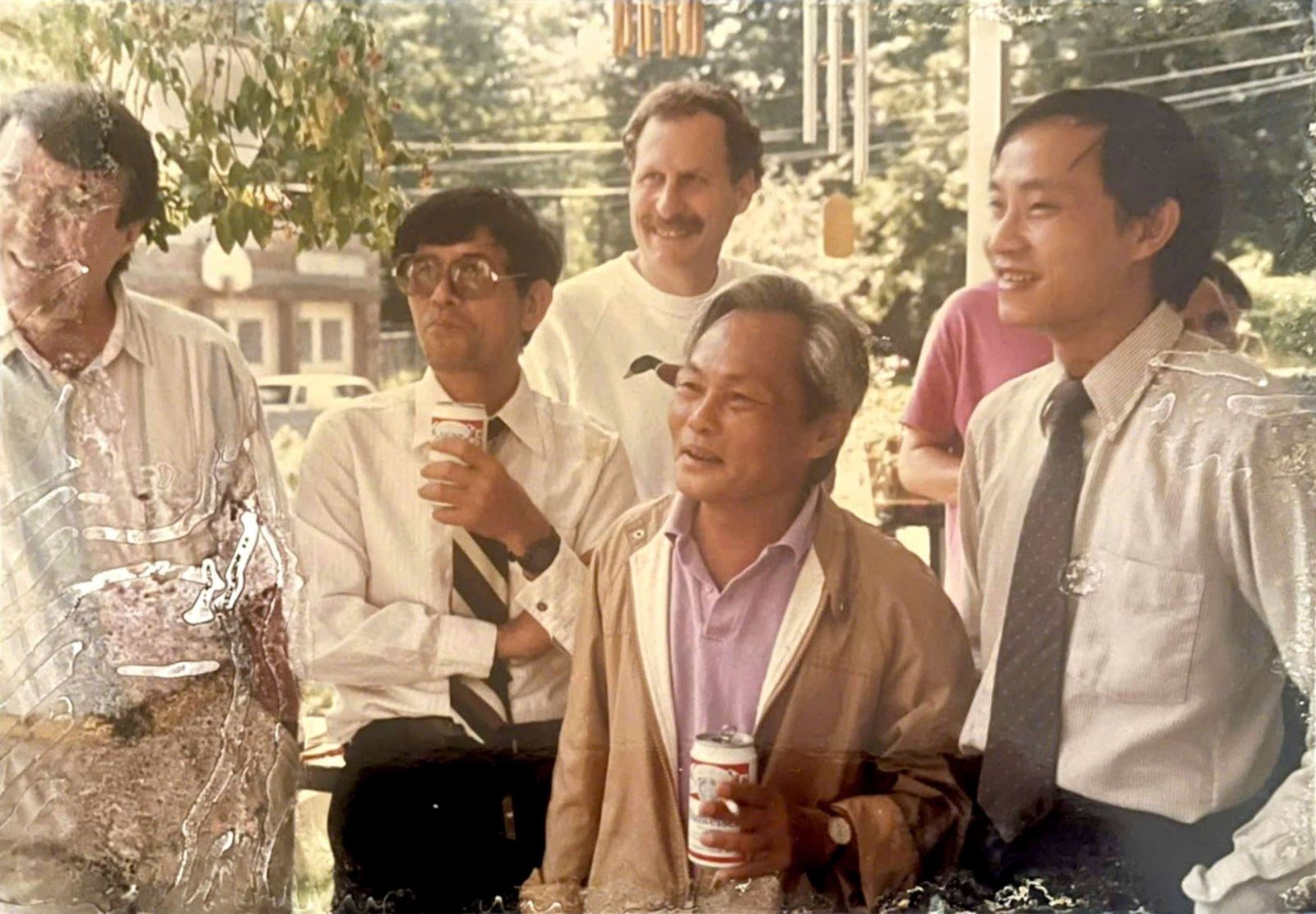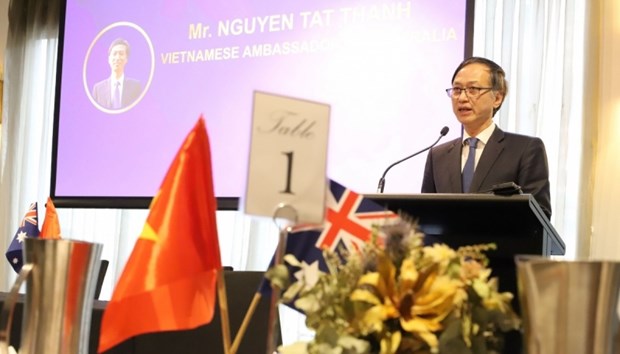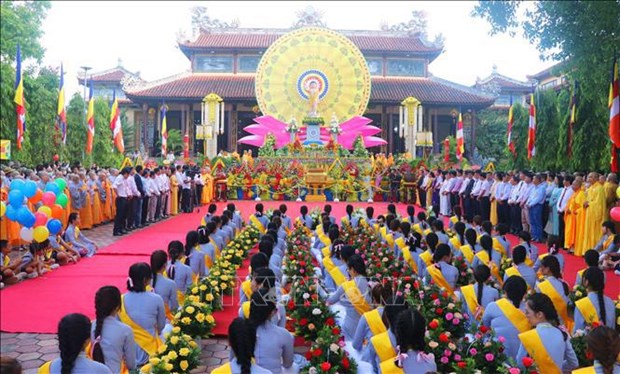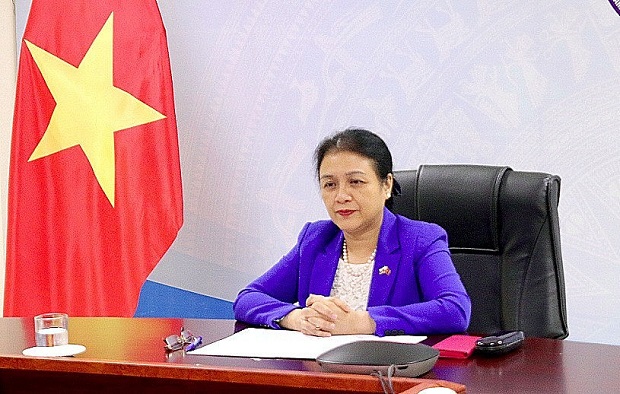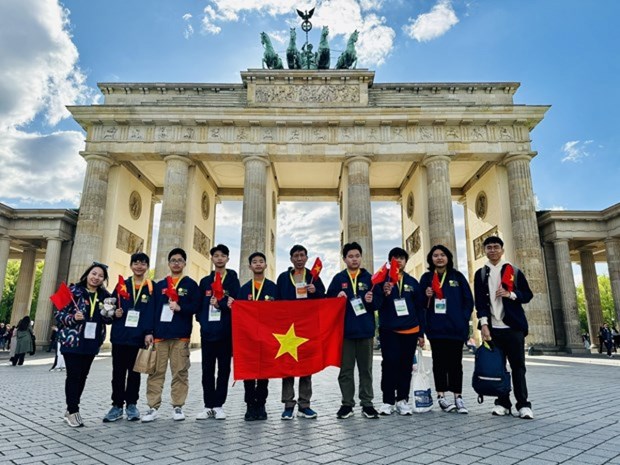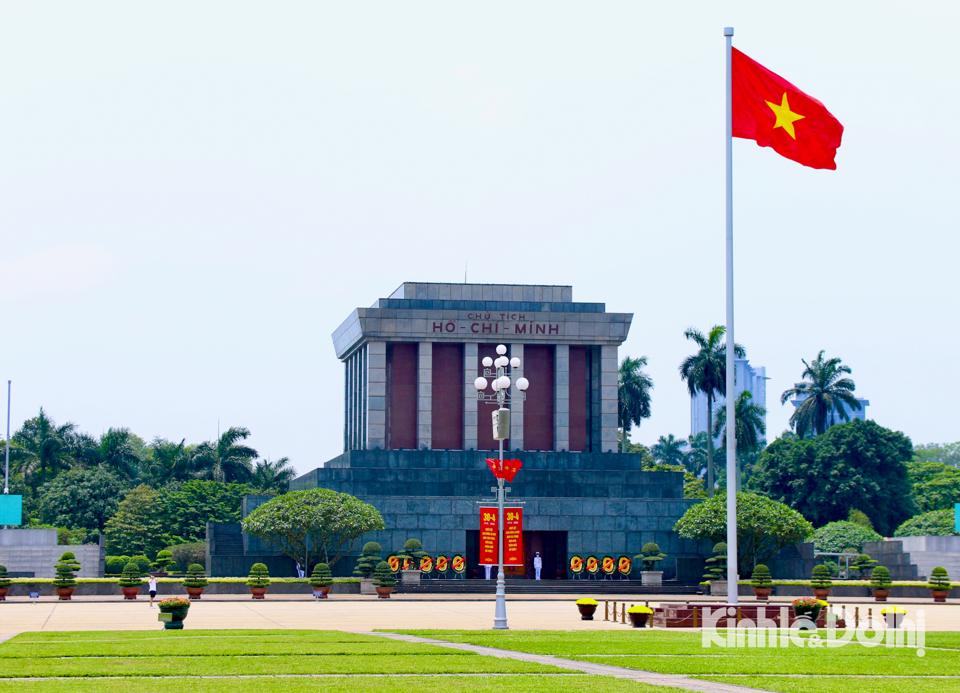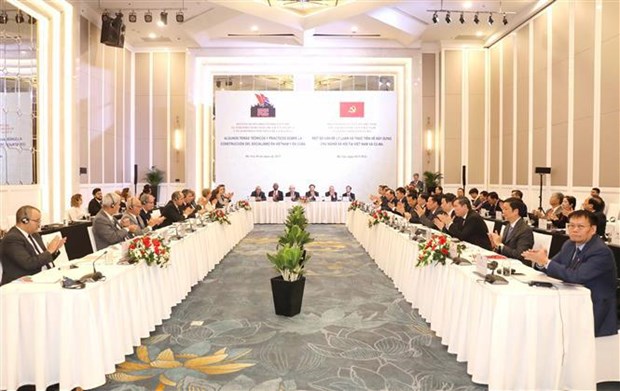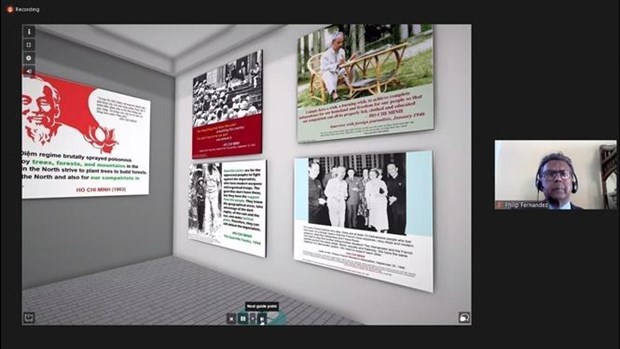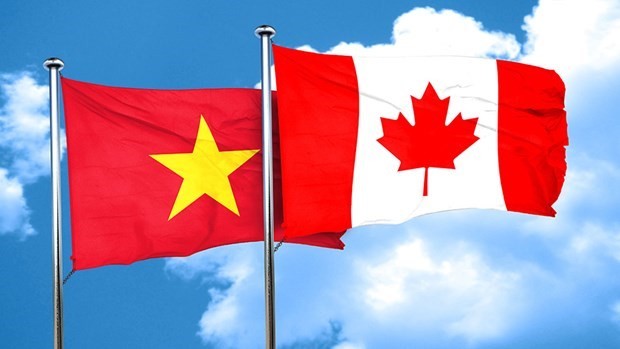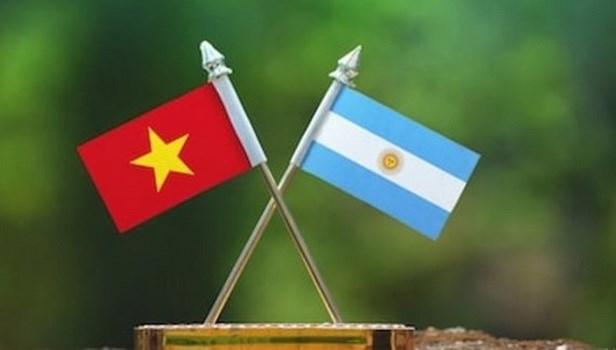Green bamboo, evergreen
Bamboo hedges have been in legend.
Gaunt stem, fragile leaves
But bamboo forms ramparts.
There goes a popular Vietnamese poem that depicts the aesthetic look of bamboo, using it as a metaphor to extol the Vietnamese people’s ingrained virtues of resilience, indomitability, and solidarity.
Bamboo holds great significance in the daily lives of Vietnamese people, as it is largely used in their daily life, from food to tools and homes. During the war, bamboo was also made into various kinds of rudimentary weapons. Strong roots, sturdy stems, and flexible branches are all noteworthy traits of bamboo.
In recent years, bamboo has been held in high regard within the concept of the country’s modern diplomacy to promote a unique and special foreign policy of independence, self-reliance, flexibility, and diversification of relations.
The idea of bamboo diplomacy was first coined by Party General Secretary Nguyen Phu Trong in a diplomatic conference in 2016. At the event, he highlighted the importance of diplomacy in maintaining peace, preventing conflict, and fostering international cooperation in the context of the rapidly changing world.
The leader also emphasised Vietnam’s distinctive approach to diplomacy, reflecting the teachings of late President Ho Chi Minh who often used the image of bamboo as a metaphor to describe the resilience, flexibility, and strength of the Vietnamese nation.
Since then, bamboo diplomacy has been reaffirmed as the guiding principle for Vietnam’s foreign policy, and the Party chief explicitly reiterated this concept at the first-ever National Conference on Foreign Affairs, held in Hanoi on December 14, 2021.


“Vietnamese diplomacy is soft and wise but still persistent and resolute; flexible and creative but consistent, valiant and resilient against all challenges and difficulties facing national independence and people’s happiness; and united and humanitarian but resolute, persistent and patient in safeguarding the national interest.”
Party General Secretary Nguyen Phu Trong
Utilising invariables in response to variables
Generations of Vietnamese leaders have built and nurtured a unique and special foreign relations strategy that holds independence, resilience, and national interest in the greatest esteem. These are the unwavering principles amid numerous variables, especially the heightened strategic competition among the major powers.
According to the Party leader, the roots of Vietnamese diplomacy are honourable conduct, humanitarianism, peace, justice, and righteousness, all of which contribute to the country’s prosperity and its people’s well-being. He reiterated that President Ho Chi Minh laid a firm foundation for revolutionary diplomacy which fought for national independence and territorial integrity.
Inheriting from his forefathers’ diplomatic philosophy, President Ho Chi Minh, the founder of modern Vietnam and its first foreign minister, developed his own thoughts on diplomacy that combined patriotism, national culture, diplomatic tradition, and human culture.
The late leader advocated that national independence and socialism must be pursued together, along with self-reliance and self-dependence, and accompanied by international solidarity. He also stressed the significance of developing national strengths that are aligned with those of the era to ensure that the country is able to adapt itself to and thrive in any circumstances.

President Ho Chi Minh talking to officers and soldiers of the Tien Phong Division at the Gieng Temple on September 19, 1954, where he said:
“The Hung Kings had the merit of founding the country, we must work together to protect it.” (File Photo. Source: Dang Cong San)

President Ho Chi Minh with people from all walks of life (File Photos. Source: VNA)
“Taking a broad view and thinking carefully” are the guidelines the late President formed for revolutionary diplomacy. This suggests that diplomacy should be approached in a comprehensive and thoughtful manner, taking into account various factors and potential outcomes to ensure national interests. In that sense, independence and self-reliance must be closely associated with international solidarity and cooperation.
President Ho Chi Minh also placed great importance on building friendship and cooperation with neighbouring countries, expanding relations with countries on all five continents, and establishing ties with major powers in the interest of the revolution.
In particular, he always placed Vietnam in the context of the world’s development and paid close attention to major global trends. His diplomatic philosophy reflects the peace-loving tradition of the Vietnamese nation and harmoniously combines national and international values.
In line with President Ho Chi Minh’s views, Party leader Trong emphasised the important role of diplomacy in the national revolutionary movement, which contributed to Vietnam’s significant victories.
From Bamboo to Diplomacy
Vietnam’s determination to pursue a foreign policy that draws on these characteristics is seen as a pragmatic response to the challenges facing the country in a rapidly-changing world, according to scholars.
Phan Xuan Dung, Research Officer at the Vietnam Studies Programme of the Singapore-based ISEAS–Yusof Ishak Institute, pointed out that bamboo grows in groups and is stronger when standing together, reflecting the importance of collective strength and unity in the Vietnamese culture, making it an ideal embodiment of Vietnam’s foreign policy.
Strong roots are core guiding principles such as national interests, independence, self-reliance, diversification, and multilateralisation of external relations. These principles are deeply rooted in late President Ho Chi Minh’s thoughts on diplomacy and provide the foundation for the country’s foreign policy, Dung said.
The solid stems signify Vietnam’s resilience in implementing its foreign policy despite the various challenges it is facing. This reaffirms Vietnam as a friend to all nations, one that is building strong relationships that can withstand strong storms.
The flexible branches represent Vietnam’s ability to be steadfast in principles while being flexible in tactics, he said.

Bamboo performance at 31st SEA Games in Hanoi in 2022 (Source: VNA)
Carl Thayer, Emeritus Professor at the University of New South Wales, said by understanding the concept of bamboo diplomacy, anyone can gain valuable insights into the building blocks of Vietnam’s success.
Bamboo diplomacy is not only about reacting to great power shifts, but also about promoting Vietnamese culture, identity, and economic ties with strategic and comprehensive partners, he said. It is guided by many Vietnamese terms that shape its practice, including multilateralism, diversification, self-reliance, and independence.
Pursuing this diplomacy, Vietnam remains consistent with its “Four No’s” principles enunciated in the 2019 National Defense White Paper, which are neither joining any military alliances, siding with one country against another, giving any other countries permission to set up military bases or use its territory to carry out military activities against other countries, nor using force or threatening to use force in international relations, Thayer said.
“This approach reflects the fact that over the decades, the country has remained a resilient bamboo patch, independent, and self-sufficient.”
“Vietnam’s bamboo diplomacy is characterised by independence, positivity, and a commitment to non-interventionism. Vietnam can be counted on to uphold its values and principles, even in the midst of a complex and ever-changing geopolitical landscape.”
Carl Thayer, Emeritus Professor at University of New South Wales, Canberra

Vietnam’s bamboo diplomacy has a crucial role to play in the national revolutionary movement, which contributed to Vietnam’s significant victories, including the negotiations on and the subsequent signing of the Geneva Agreement in 1954 and the Paris Peace Accords in 1973. These agreements ushered in an era of peace, independence, unification, and development in Vietnam.


The signing of the Paris Peace Accords on ending the war and restoring peace in Vietnam on January 27, 1973, marks a brilliant milestone in the history of Vietnamese revolutionary diplomacy in the Ho Chi Minh era. This tremendous victory is not only for the Vietnamese people but also for peace lovers around the globe. (File Photos. Source: VNA)
Yoichiro Sato, Professor at the Ritstumeikan Asia Pacific University, said given Vietnam’s history of war and the need for self-reliance, it is understandable why bamboo diplomacy became an important and fundamental aspect of Vietnamese culture and national character. “Vietnam’s bamboo diplomacy is a realistic approach to protect its national interests,” he said.
Sato noted that Vietnam’s history of resilience and ability to withstand external pressure has a role to play in shaping the country’s bamboo diplomacy. Throughout its national history, Vietnam has faced multiple foreign powers and other challenges, yet the country has managed to survive and maintain its independence.
Moreover, the Vietnamese government has consistently emphasised the importance of independence, even during the recent peak of the COVID-19 pandemic, Sato said. Despite facing a serious shortage of vaccines during the initial stage of the pandemic, Vietnam called for national unity to keep all people together to overcome the challenges, and to leave no one behind, he added.

“I think the emphasis on national independence and unity is not something unique in Vietnam, but my impression is that it is particularly strongly emphasized in Vietnam’s case. And that’s very important.”
Yoichiro Sato, Professor at Ritstumeikan Asia Pacific University
Vietnam has so far established diplomatic ties with 190 out of the 193 UN members. Meanwhile, the Party has established relations with 247 political parties in 111 countries, and the National Assembly has relationships with the parliaments of 140 countries, according to Vietnam’s Ministry of Foreign Affairs.
As for multilateral diplomacy, Vietnam has proven to be a responsible member of more than 70 international organisations and forums, including the UN, ASEAN, APEC, ASEM, and the WTO.
The country has fulfilled its international responsibilities as a non-permanent member of the UN Security Council, rotating chair of ASEAN, and host of the ASEAN Summit, ASEM Summit, APEC Summit, and World Economic Forum on ASEAN.


Bamboo Diplomacy: From Words to Action
According to Minister of Foreign Affairs Bui Thanh Son, Vietnam’s bamboo diplomacy is reflected in all of its foreign activities. The policy also affirms Vietnam as a brave, sincere, loyal, reliable, and responsible nation.
Amid strong global headwinds, bamboo diplomacy allows Vietnam to forge a diverse network of partnerships, especially with major powers. These relations have aided the country in expanding trade and investment connections, enhancing national defence capacity, increasing international prestige, and ensuring a peaceful and stable external environment for national development.
The foreign minister highlighted 2022 marked a surge in Vietnam’s foreign activities, with comprehensive implementation across all channels of the Party, State, Government, National Assembly, and people-to-people exchange.
Also in 2022, Vietnam protected more than 21,000 of its citizens abroad. Amid the Russia – Ukraine conflict, authorities completed the safe evacuation of approximately 6,000 nationals from the conflict zone. They also brought back 1,400 Vietnamese people scammed into working illegally in Cambodia. Vietnam also took measures to protect citizens and brought 700 of its fishermen back home, according to the Ministry of Foreign Affairs.
Behind these achievements is the application of Vietnam’s bamboo diplomacy, according to scholars.
According to Phan Xuan Dung, bamboo diplomacy is a suitable concept for promoting Vietnam’s diplomatic identity in the current context. First, it is appropriate because the image of bamboo is deeply ingrained in Vietnamese culture, values, and diplomatic traditions. Second, the recent promotion of bamboo diplomacy reflects Vietnam’s confidence in its diplomatic achievements and implementation of foreign policies, Dung explained.
In particular, he said, Vietnam’s international integration since the start of Doi Moi (Reform) policy in 1986 has proved highly successful. As General Secretary Nguyen Phu Trong stated, Vietnam “has never had such a great fortune, potential, international stature and prestige as it is having now.”

“Bamboo diplomacy allows Vietnam to forge a diverse network of partnerships, especially with major powers. Most importantly, this approach enables Vietnam to maintain its independence and autonomy amidst growing major powers’ competition in the region.”
Phan Xuan Dung, Research Officer at ISEAS–Yusof Ishak Institute, Singapore
Through these relations, Vietnam has been able to expand trade and investment ties, enhance its national defense capabilities, gain international prestige, and ensure a peaceful and stable external environment for national development, Dung said.
Thirty years ago, Vietnam had trade relations with only 30 countries and territories, but now the figure has amounted to 230. Particularly, Vietnam has signed a number of free trade agreements, including new-generation ones such as the Comprehensive and Progressive Agreement for Trans-Pacific Partnership (CPTPP), the EU-Vietnam Free Trade Agreement (EVFTA), and the Regional Comprehensive Economic Partnership (RCEP).
According to Stephen Nagy, Professor at International Christian University, through the application of bamboo diplomacy in a flexible, resilient, and responsive manner, Vietnam has successfully maintained pragmatic relationships with major countries and other Southeast Asian nations to promote its own development and security agenda.

“Vietnamese bamboo diplomacy is pragmatic, realistic, and regionally focused. It’s pragmatic in terms of forming relationships with all different kinds of countries, primarily focusing on Southeast Asia, and working with extra-regional partners to improve its security, stability, and prosperity.”
Stephen Nagy, Professor at International Christian University, Tokyo
Both Dung and Nagy see Vietnam as a middle power. They quoted the Asia Power Index 2023 from the Lowy Institute as saying that by the latest rankings, Vietnam was the second-most diplomatically influential country in Southeast Asia.
Vietnam was ranked 12th out of the 26 countries in terms of comprehensive power in Asia in 2022, unchanged compared to 2021, according to the institute’s report.
The rankings were weighted on eight thematic measures of power, divided into two groups: resources (economic capability, military capability, resilience, future resources), and influence (economic relationships, defense networks, diplomatic influence, and cultural influence).
Accordingly, Vietnam made it into the top 10 of the future resources, economic relationships, and diplomatic influence in Asia.
“If we use data sets like the Lowy Institute’s Asia Power Index, it’s clear that Vietnam is a middle power in terms of its overall resources, population, economic size, and diplomatic power,” Nagy said.
Vietnam has undertaken some economic reforms over the past 40 years to attract overseas development aids, as well as foreign direct investment to position itself as a new manufacturing hub in Southeast Asia, he added. “The move contributes to increasing prosperity and accelerating the development of Vietnam.”
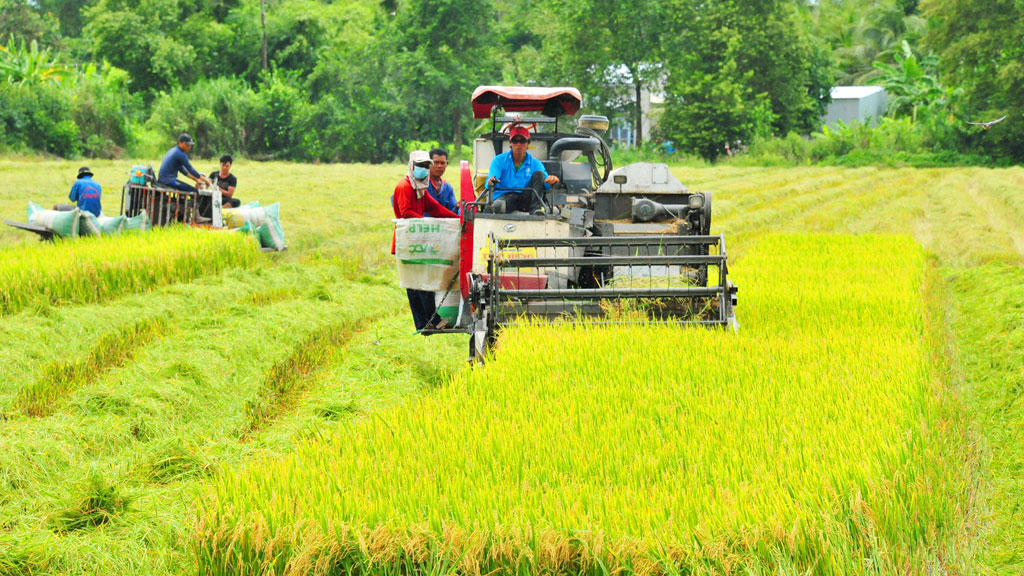

Despite the challenges posed by the COVID-19 pandemic, Vietnam remains one of the top 20 recipients of foreign investment in 2020, as reported by the UN Conference on Trade and Development. (Source: VNA)
Besides the economic dimension, scholars like Thayer and Dung provided a concrete example that demonstrates the success of Vietnam’s bamboo diplomacy in promoting cultural values.
It is the country’s ability to attract a growing number of tourists and build strong bonds with people from different countries, based on the appeal of Vietnamese culture, politeness, and cuisine, Thayer said.
“This soft power approach is a key component of Vietnam’s bamboo diplomacy, which emphasises the need to build positive relationships with other countries and foster mutual understanding and respect.”
Agreeing with Thayer, Dung said by promoting the diplomatic identity of resilience, solidarity, and flexibility embodied by bamboo, Vietnam showcases its unique cultural identity and fosters a positive image of the country abroad.
After a two-year hiatus due to COVID-19, Vietnam reopened its doors to international tourists on March 15, 2022, and has since seen a surge in foreign holidaymakers visiting the country.

Bamboo diplomacy: Path ahead
Scholars pointed out that Vietnam is facing a growing number of challenges as it navigates the rapidly changing global situation. These challenges are exacerbated by various factors, including global geopolitical tensions and economic slowdown.
The COVID-19 pandemic has presented significant challenges to foreign policy, including Vietnam’s bamboo diplomacy, according to Nagy. Large-scale lockdowns and travel restrictions have disrupted global supply chains, and all countries have been affected.
It is likely that these challenges will persist, and there may be further unexpected events, such as natural disasters, transnational disease outbreaks, or economic recessions that make it more difficult for Vietnam and other countries to balance their relationships, he went on.
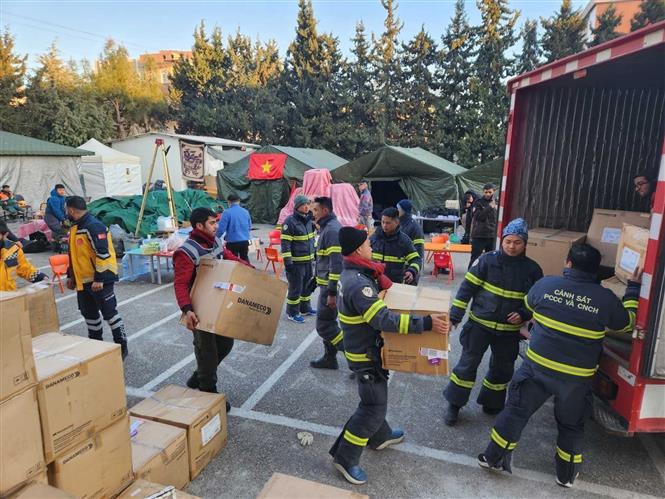

Vietnamese search and rescue teams join international efforts in addressing the consequences of the deadly earthquake in Turkey early this year (Source: VNA)
Vietnam needs creative solutions and a continued focus on flexibility and resilience in foreign policy, to counter a number of challenges ahead, according to scholars.
Vietnam must tackle these headwinds with great care and skill if it wishes to maintain its independence, promote its interests, and uphold its values, Thayer said, adding that the country also needs good relations with all major powers to achieve its goals of raising income levels and developing the economy.
“Vietnam could use its relationships with multiple partners to its advantage. Even if these partners have disagreements with each other, Vietnam can still navigate these situations to benefit its own interests.”
This is possible because Vietnam can leverage its position as a trusted partner and mediator to help resolve disputes or find mutually beneficial solutions, Thayer said.
According to Sato, amid growing international tensions, Vietnam is expected to continue its bamboo diplomacy due to its success in maintaining balanced relationships with all nations. However, as its strength and influence increase, greater efforts are required to build on its accomplishments.
Meanwhile, Dung pointed out that despite the growing external challenges, Vietnam has been able to maintain its independence and autonomy while recording high economic growth and building closer ties with all major powers in the region.
“Vietnam’s reputation has continued to rise on both regional and international platforms. Consequently, Vietnam has compelling reasons to continue its bamboo diplomacy to advance its foreign policy goals,” he said.

Scholars held that Vietnam must ensure sufficient flexibility, resilience, and adaptability to maintain its strategic autonomy, good partnerships, and sound relations with all nations.
By balancing its relationships and adapting to different circumstances, Vietnam can continue to secure its national interests while maintaining a good rapport with countries across the globe, according to Nagy.
He suggested Vietnam continue building dialogue with various partners, investing in young people so that they can effectively communicate and engage with the regional community, and working with regional and international partners to sustain economic growth.
Amidst formidable challenges ahead, Vietnam is determined to build on the achievements of bamboo diplomacy and continue this approach as a unique foreign policy. By doing so, Vietnam is positioning itself as a rising player in the international arena and charting a path toward a brighter and more prosperous future, according to scholars./.

